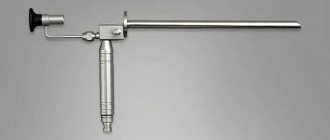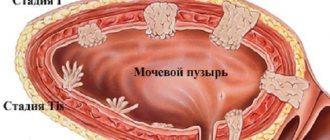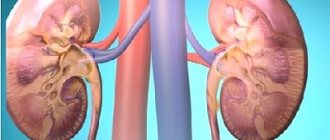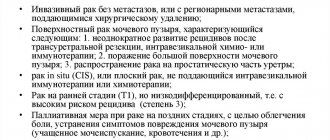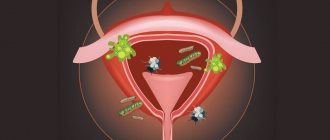Pain when urinating in men is a symptom that cannot be ignored. It may indicate various diseases of the genitourinary system.
If you feel discomfort, make an appointment at the Promedica clinic in Belgorod as soon as possible. We guarantee you careful attention to even the most delicate problem.
In our medical center, consultations are conducted by qualified urologists with extensive clinical experience. Following their recommendations will help you avoid complications, get rid of discomfort and improve your quality of life.
Symptoms of problematic urination
The process of urination is a function of the human body, without which the patient cannot live, since it will be impossible to extract harmful substances from it.
Not every pain when urinating in men should be paid attention to, since one-time failures in the system are not a pathology and the intervention of urologists is not required. But it should be understood that problems with the outflow of urine affect the removal of toxic substances from the human body.
Within normal limits, a man's urine should flow without pain, and before that, physiological fluid accumulates in the bladder reservoir before being released along with toxins.
You should contact specialists if you have:
- cutting pain in the pubic area and lower back;
- symptoms that do not go away for a couple of days;
- rapid increase in body temperature;
- decreased performance;
- strange foamy or purulent discharge from the penis;
- the presence of severe pain that affects the lower abdomen and leg;
- reducing the volume of urine excreted during the day;
- painful urination.
You can independently relieve acute pain at the end of urination in men by using painkillers. Experts say that in this case there is a rapid decrease in pain, but the disease itself does not go away and requires professional treatment.
Vesiculitis
Inflammation of the seminal vesicles, a paired organ responsible for the nutrition of sperm, their mobility and protection from external factors. Vesiculitis develops for the same reasons as prostatitis; therefore, 2 types of disease are distinguished:
- Infectious . Associated with the entry and development of microorganisms. Most often these are E. coli, streptococci, staphylococci, and pathogens of sexually transmitted diseases.
- Aseptic . It occurs due to stagnation of blood, non-penetrating wounds of the perineum (often blows to the groin), vibrations during work.
Manifestations of vesiculitis are as follows:
- pain when urinating;
- pain and pain in the perineum, groin;
- spasms, discomfort during and after sexual intercourse;
- feeling of residual urine after emission;
- frequent urge to go to the toilet.
Sexually transmitted infections or STIs
This group unites microorganisms of different types - microbes, viruses, protozoa. A distinctive feature of most infections is that they are associated with sexual contact; as a rule, the first symptoms appear 1–5 days after it. But there are exceptions when manifestations can occur over a longer period - a month or two or more. For example, chlamydia entered the body in July, and was activated in October after suffering from acute respiratory viral infection or hypothermia.
List of common STI pathogens:
- gonococcus;
- chlamydia;
- treponema pallidum;
- cytomegalovirus;
- herpes simplex virus;
- gardnerella;
- mycoplasma;
- ureaplasma;
- Trichomonas.
STIs can provoke the development of urethritis, cystitis, prostatitis and other inflammatory diseases of the genitourinary system. Clinic characteristic of sexually transmitted diseases:
- pain, discomfort, burning in the genitals;
- mucous, white or purulent discharge;
- redness of the head, foreskin;
- pain during and after sexual intercourse;
- painful and frequent urination, there may be false urges;
- unpleasant odor;
- rashes in the groin area, genitals;
- enlarged inguinal lymph nodes;
- erectile dysfunction;
- infertility.
What diseases does the symptom indicate?
Next, we will look at the main pathologies, the symptoms of which are burning, stinging and itching during urination.
Urethritis
Burning during urination in men can be a consequence of urethritis, i.e. inflammation in the urethra. It is formed as a result of infectious bacteria entering the body, for example, during sexual intercourse, or as a result of hypothermia.
Symptoms may include:
- discharge of purulent secretion from the urethra;
- inflamed foreskin;
- pain during sexual intercourse;
- pain and itching;
- difficulty while urinating.
Urethritis
Urogenital chlamydiasis
Itching and burning when urinating in men may indicate the presence of urogenetic chlamydia.
This anomaly is infectious in nature, affecting the genitourinary system. It is difficult to recognize and treat. It often occurs without obvious symptoms.
The disease can also manifest itself:
- increased body temperature;
- bloody discharge during ejaculation;
- morning mucous discharge;
- unpleasant sensations in men after sex.
Pain in the head after urination in men is a serious reason to immediately consult a doctor. You also need to remember that during the course of treatment you must give up alcohol.
Prostatitis
Prostatitis can also cause a burning sensation when urinating in men. It begins to develop with a passive lifestyle, as a result of frequent colds, infectious diseases of the genitourinary system, and groin injuries.
The main symptom of prostatitis is an inflamed prostate
Associated symptoms:
- frequent urination in men;
- pain in the genitals;
- detection of bloody traces in the urine;
- pain in the lower abdomen;
- burning and difficulty before urinating;
- violation of potency.
Prostate adenomas
Prostate adenoma or BPH is a benign tumor in the prostate gland. This is a pathology that affects older men. Hormonal changes in the body, as a rule, provoke the development of hyperplasia, which in turn causes pain after urination in men, a frequent desire to visit the toilet, and intermittent urine output.
Phimosis
The development of phimosis in a man causes complications with urination and burning of the head during urine output. The urination process is accompanied by severe pain.
This disease is characterized by fever and enlarged lymph nodes. With progressive phimosis, surgery cannot be avoided. Corticosteroid therapy is also used, but treatment does not fully guarantee recovery.
Urolithiasis disease
Painful sensations when visiting the toilet appear during the period of acute manifestation of urolithiasis. The movement of stones through the urethra awakens a strong sensation of pain in:
- lumbar area;
- groin;
- genitals;
- covers the lower abdomen and is accompanied by:
- feverish condition;
- elevated temperature;
- vomiting.
Blood in the urine and pain when visiting the toilet are also symptoms of a foreign body moving through the ureter.
Allergy
A reason that can cause a burning sensation when urinating in men may be an allergic reaction to certain products, for example, excessive consumption of:
- coffee;
- alcohol;
- citrus fruits;
- carbonated drinks.
Soaps and shower gels can also cause a slight burning sensation. Your doctor will help you identify the causes of your discomfort.
Other diseases
Inflammation of the bladder (cystitis) and kidneys (pyelonephritis) also provokes the phenomena under consideration. The advanced state of the disease usually leads to complications such as impotence and infertility, and can also lead to oncology.
Symptoms of the disease
Acute urethritis
The acute stage of the disease occurs 5-14 days after infection. The first sign that forces a man to consult a urologist is the appearance of painful sensations (usually of high intensity) during urination.
Often the pain is accompanied by a burning sensation, which can be almost unbearable. Itching with urethritis is usually absent, but in exceptional cases this symptom can be diagnosed during the acute course of the infection.
The appearance of uncharacteristic discharge may also indicate the presence of acute inflammation in the urethral mucosa. The discharge may be thick, mucous, sometimes streaked with blood and purulent contents, or thick, creamy/yellow in color (pus only).
Acute urethritis can also be recognized by other symptoms, which usually manifest themselves very clearly:
- redness of the area surrounding the opening of the urethra;
- drying and sticking of the urethral opening in the morning;
- presence of blood in semen or urine;
- discomfort during sexual intercourse (sharp stabbing pain may be experienced);
- temperature in the area of subfebrile values (an uncharacteristic sign, since most cases of the disease resolve without an increase in the thermometer).
About 10 percent of cases of urethritis in men occur without symptoms (or their severity is so insignificant that it is not considered important). Therefore, it is important to notice any changes in your health and undergo regular preventive examinations and examinations.
Doctor's advice
If urethritis occurs, it is very important not to self-medicate, but to consult a urologist as soon as possible and undergo a full examination. The etiology of urethritis is varied and it is important to establish the cause of the inflammatory process, otherwise the process can easily become chronic and complications will arise.
Inna Zhikhoreva Dermatologist, Venereologist, Hair diseases
Chronic urethritis
After two weeks, in the absence of adequate treatment, urethritis can become chronic. The characteristic symptoms of this type of infection are the same as in the acute stage, but their intensity is much lower.
Pain persists when trying to empty the bladder, the amount of discharge begins to decrease, and in some cases this symptom does not bother the man at all at this stage.
Chronic urethritis is dangerous due to its complications, including very serious ones, such as blood poisoning. In addition, do not forget that the infection can lead to infection of other organs and disruption of their functioning.
Causes of acute pain when urinating
If discomfort occurs during urination, this may be due to the occurrence of certain diseases of the genitourinary system. Experts say that an equally common symptom may be the presence of an inflammatory process in the male body.
Pain and burning sensation during urination in men may appear of varying intensity and nature as an additional sign of certain diseases:
- urethritis;
- cystitis;
- pyelonephritis;
- chlamydia;
- gonorrheal processes;
- prostatitis.
Acute pain and pain when urinating in men are most often associated with infectious diseases and inflammation, but sometimes the problem has nothing to do with infection and occurs in the form of:
- urolithiasis;
- phimosis;
- malignant or benign tumors of the urinary system;
- complete or partial blockage of the ureters;
- colic in the kidneys;
- various serious injuries that affected the urethra;
- surgical interventions at different times;
- burning sensations of a neurogenic nature;
- chronic overheating or hypothermia of the lower abdomen.
For pain when urinating in men, the causes are quite difficult to establish, but they are accompanied by the appearance of foul-smelling discharge from the urethra, rapid swelling, itching and redness of the head of the genital organ.
It is strictly forbidden to engage in self-diagnosis and treatment of a disease that is accompanied by itching or burning in the area of the phallus and scrotum when urinating. It would be best to contact a medical center for tests, after determining the results of which they will prescribe adequate treatment, contact certified doctors.
Prostatitis
The seminal gland, the prostate, is located in the perineum of men. In the reproductive system, its function is extremely important - the secretion of secretions necessary for the development and nutrition of sperm. Inflammation of the organ - prostatitis - is dangerous due to infertility, the development of an abscess, and the spread of infection to neighboring organs of the genitourinary system.
Characteristic signs of prostatitis:
- pain in the scrotum, sacrum and perineum;
- feeling of incomplete emptying of the bladder;
- pain, cutting when urinating;
- frequent urination;
- difficulty conceiving;
- rarely – fever, inability to urinate.
Predisposing factors for the development of prostatitis are hypothermia, constipation, intoxication with alcohol or other substances, and prolonged exposure to vibration in motorcyclists and tractor drivers.
Separately, congestive prostatitis is associated with impaired blood flow in the pelvic organs. The main reasons for this are spinal injuries, curvature of the spinal column, and pelvic distortion.
Other violations
There are several causes of burning in the urethra after urination in men that cannot be classified into any category.
- Traumatization of the genital organs - a bruise of the penis, the presence of a hematoma - can cause a similar reaction in the body in representatives of the stronger sex.
- Itching in the urethra is often a consequence of an allergy to the detergents used by the patient - creams and gels for intimate hygiene. Such products contain chemicals that are aggressive to the urethral mucosa.
- Malignant and benign neoplasms - if they are localized in the pelvic area, then a burning sensation at the time of urine output or at the end of urination manifests itself as a result of compression of the genitourinary tract.
- Sometimes men experience pinching in the urethral canal and a feeling of discomfort in it due to the consumption of various food irritants. Aggressive products include vinegar, alcohol, citrus fruits, tea, coffee, soda, and spices. If you notice that a burning sensation appears after eating such foods, then to eliminate the unpleasant symptoms it is enough to simply exclude them from your menu.
What is non-infectious urethritis
The disease is not always caused by bacteria - in some cases, injury to the urethra can lead to the appearance of foci of inflammation (for example, during manipulations using medical supplies).
A stone passing through the urethra can also scratch the walls of the canal - the resulting wounds and abrasions are an excellent environment for the development of pathogenic processes of various origins.
Acute non-infectious urethritis can be caused by other reasons, including:
- allergic reaction (most often occurs to substances and solutions that are used to treat instruments for performing medical procedures with their introduction into the urethra);
- disruptions in metabolic processes;
- an increase in the content of oxalic and uric acids in the urine (as urine passes through the urethra, irritation of the mucous epithelium occurs, followed by inflammation).
Non-infectious urethritis can become secondary infectious if a bacterial infection joins the process (in cases where pathogens immediately enter the urethra, we are talking about primary urethritis).
Some types of diseases associated with pain when urinating in men
Discomfort when urinating in men can be caused by many types of diseases of the genitourinary system, including urolithiasis. According to experts, this disease affects not only old people, but also little boys, so you should pay attention to some symptoms that are a sign that stones are forming in the body:
- pain occurs in the lower abdomen and perineum;
- increased pain when moving or urinating;
- constant urge to urinate;
- frequent need to urinate often appears when moving or driving off-road;
- suddenly the stream of urine disappears, but the feeling of emptying often does not occur;
- discomfort in the phallus when urinating;
- decrease in standard urine volume.
Pain when urinating in men, the causes of which cannot be determined independently, may suffer from urethritis or an inflammatory process in the area of the urethra. To treat this disease, you should determine the causes of the above disease, since the problem can be associated with various pathogens, including Trichomonas, E. coli, chlamydia, and pathogenic fungi.
With urethritis, the first symptoms of the disease appear approximately seven to twenty-eight days after infection. An accurate diagnosis can be made by diagnosing the patient's symptoms:
- disturbances in urine excretion;
- the presence of acute pain and itching in the phallus and scrotum of men;
- discharge of blood or pus from the urethra;
- the presence of mucous discharge with an unpleasant odor;
- redness on the head of the genital organ;
- rapid increase in body temperature;
- sticking of the urinary opening on the penis.
If the disease is not treated, the problem develops into a chronic form, and in parallel, a man may develop not only epididymitis, but also orchitis.
Most problems are associated with inflammation of the prostate gland, often accompanied by a number of symptoms:
- delayed urine flow;
- persistent problems that arise in the pubic part of the abdomen;
- the presence of bloody and purulent discharge in the urine and semen;
- the presence of pain in the scrotum and penis;
- the occurrence of unpleasant sensations in the legs, which intensify when walking;
- frequent urination in men;
- chills and constant hot flashes;
- pain in the lumbar region with sudden lifting of weight;
- rapid increase in body temperature.
An acute form of the inflammatory process in the prostate can occur with a sedentary lifestyle, excessive physical activity or poor diet. It often becomes chronic if not treated correctly, when it hurts even to sit and walk.
Problems during or after the passage of urine from the body can be diagnosed if a person suffers from infectious diseases, inflammation of the lining of the bladder (cystitis). When cystitis appears in the body, you should pay attention to the presence of unpleasant sensations in the sacrum and lower abdomen when urine is emitted, which takes on a dark tint.
If sexually transmitted infections enter the body, then acute pain and burning during urine discharge are combined with swelling of the head of the genital organ, discharge from the urethra, resembling droplets mixed with pus and mucus.
According to an article on a medical website, you can understand that discomfort in the penis and scrotum after urination occurs:
- inflammation of the mucous membranes of the bladder;
- the appearance of stones or sand that cause microtrauma to the urethra;
- rapid contraction of the muscles of the bladder and urinary tract;
- narrowness of the urinary tract with prostatitis, adenomas, tumors of the genital tract.
Urinary tract infection or UTI
Predisposing factors:
- diabetes;
- age over 40 years;
Important! Urinary tract infections tend to be ascending - the movement of the inflammatory process is directed from the urethra to the kidneys. There is also a reverse path - downward, but less often.
Urethritis
The urethra is a canal connecting the bladder to the outlet; The main function is to remove urine from the body. From the inside, the canal is lined with mucous membrane, which is always moist and warm - such conditions are optimal for the rapid development of microflora.
According to statistics, urethritis is the most common disease from the UTI group, which is due to a longer urinary canal than in women, as well as the constant presence of microorganisms on the skin and mucous membranes. Urethritis is divided into 2 types:
- Non-specific . It develops as a result of the introduction of staphylococci, E. coli, streptococci, fungi, etc. into the mucous membrane of the urinary canal.
- Specific . Occurs due to pathogens that cause sexually transmitted infections.
Manifestations of urethritis in men:
- pain when urinating;
- mucus in the urine;
- mucous or purulent discharge from the glans penis;
- pain in the urethra.
Important! Blood in the urine, high fever, chills, pain in the groin or lower back, urinary retention are signals to immediately seek medical help. Such manifestations may indicate a purulent process, the spread of infection, or involvement of surrounding tissues.
Cystitis
Inflammation of the mucous membrane of the bladder, accompanied by dysfunction of varying degrees of severity. It is observed quite rarely in men, which is associated with the anatomical features of the structure of the urinary tract (UT).
The main manifestations of cystitis:
- cutting, pain at the end of urination;
- frequent urge to urinate;
- small amounts of urine;
- not always - drops of blood, mucus at the end of the process;
- cloudy urine, sometimes with an unpleasant odor;
- pain in the lower abdomen, groin, scrotum;
- increased body temperature (not in all cases);
- nausea (sometimes).
Please note that cystitis is not always caused by infection. The disease can develop during radiation therapy, trauma, burns, tumors, urolithiasis as a secondary disease, in response to a negative impact.
Balanoposthitis
Inflammation of the glans penis and foreskin is called balanoposthitis. The main reasons for its development:
- lack of personal hygiene;
- intense friction during sexual intercourse;
- masturbation;
- dermatitis;
- lichen planus;
- psoriasis;
- pinched by a zipper;
- catheter insertion.
Microorganisms that cause inflammation can be specific (causative agents of syphilis, gonorrhea, chlamydia, trichomoniasis), nonspecific (opportunistic microflora that lives on the skin and mucous membranes). In cases where there are representatives of both groups, they speak of mixed infection.
General symptoms of balanoposthitis - swelling, itching of the foreskin, pain when urinating - depend on the cause that caused it:
- Fungal infection (urogenital candidiasis) - whitish discharge with a sour odor, cracks, impaired mobility of the foreskin.
- Herpes is the appearance of vesicular rashes that burst, subsequently forming crusts. Also disturbing is severe itching, enlarged inguinal lymph nodes, and pain along the nerves.
- Trauma – swelling of the foreskin is pronounced, urination is painful, often mixed with blood.
- Psoriasis – pink scaly spots on the skin of the foreskin, moderate itching.
Note! Balanoposthitis, if left untreated, can develop into a purulent-necrotic form with death of the tissues of the foreskin and penis. This situation requires long-term treatment and recovery.
When should you contact a urologist?
It is better not to delay contacting a doctor. If you experience a burning sensation, even a mild one, you should immediately go to an appointment with a urologist, venereologist or andrologist. Sometimes a consultation with an oncologist or nephrologist is required. At the first appointment, the doctor conducts an examination and also prescribes an ultrasound examination of the kidney, bladder, and prostate.
Help in making a diagnosis is provided by such diagnostic measures as taking a smear for microscopy of discharge from the urethra, collecting urine and blood for a general analysis. In some cases, spinal puncture and magnetic resonance imaging are prescribed.
How to diagnose the disease
When the first signs of pain in the bladder, scrotum and penis appear, you should see a professional urologist. In order to diagnose a pathological condition, you should pay close attention to the signs that indicate that:
- the anterior section of the urethra is inflamed, says pain at the beginning of the process of emission of urine;
- neoplasms have appeared in the prostate gland, indicating a painful sensation after the end of the process;
- there is cystitis, the urinary canal has shriveled or a tumor has appeared, pain can be felt before the first drop of urine is spilled;
- Oncological disease develops, pain and discomfort develop during the entire process of urination.
Therapeutic therapy for pain and burning in the head of the penis
To cure burning and painful urination, you can use a comprehensive application of medical and folk help.
At home, you can speed up the elimination of discomfort using this recipe.
The patient drinks 400 ml of boiled water and 200 ml of soda solution prepared with one teaspoon of soda. The water in the soda solution should not be boiled. After using this remedy, the pain subsides, however, this does not mean that you can wait any longer. You should seek immediate medical attention.
Among folk methods, there are many ways to eliminate burning of the head of the penis and pain symptoms.
- Horsetail, dried lingonberry leaves and chamomile color are mixed in half. The herbal composition is poured with boiled water in a volume of 300 ml. The composition is simmered in a water bath for a quarter of an hour. The decoction is removed from the bath, filtered (without steeping) and immediately taken hot.
- Oak bark, linden and bearberry are mixed in the same composition. The raw materials are poured into a thermos, filled with boiled water, and kept for a couple of hours. The infusion is taken in tablespoons three times a day 30 minutes before meals.
- Dried birch leaves are mixed with licorice root, bearberry, and corn silk. Each raw material is taken in equal parts. 250 ml of boiled water is poured into the herbal composition and kept in a water bath for a quarter of an hour. Then the resulting medicinal composition is removed and kept in the cold for about an hour. The resulting drug is taken warm; the medicine should not be stored in the refrigerator. Take three times a day, 30 minutes before meals.
Drug therapy
Preparations for men Drug treatment with painful urination is due to the use of antibacterial drugs, probiotics, herbal preparations, non-steroidal, anti-inflammatory drugs that eliminate pain in the head; headaches are caused by infection.
Therapeutic therapy is prescribed based on the diagnosed causes of the disease. Independent selection of medications is strictly prohibited. Since pain and burning in the head are bacterial in nature, the use of antibiotics is mandatory. In addition to antibiotic therapy, immunomodulators should be taken.
Rule for treating a pathological process
After examining blood, urine and seminal fluid, you can understand what treatment will be prescribed, depending on the characteristics of the disease being diagnosed.
If the urologist has prescribed treatment with antibacterial or anti-inflammatory drugs, then it must be completed, strictly observing the dose and duration of treatment.
To completely eliminate discomfort, the following are prescribed:
- antibiotics;
- medicines to eliminate viruses;
- medicines that kill fungal diseases;
- surgery (polyps in the urinary tract).
To eliminate pain when urinating in men, experts advise drinking as much pure water, sour juices and fruit drinks as possible, since toxic substances are thus removed from the body. You should begin treatment with caution if you have diseased kidneys or endocrine system disorders.
You can supplement traditional treatment with folk remedies, including baths, compresses and decoctions from:
- St. John's wort;
- chamomile;
- celery;
- rosehip;
- eucalyptus;
- sage;
- parsley
It is strictly forbidden to abuse coffee and tea, sweet soda and alcoholic drinks, as they negatively affect the functioning of the genitourinary system.
Alcohol
Some men report a clear connection between the consumption of alcoholic beverages and the appearance of discomfort. Along with pain during urination, exacerbation of prostatitis and erectile dysfunction are observed.
There is no direct explanation for this phenomenon; it is believed that the following changes occur under the influence of alcohol:
- immunity decreases;
- the mucous membrane becomes inflamed because toxic products of alcohol processing are released in the urine;
- microorganisms are activated.
What to do in such situations is to stop drinking alcohol or reduce the amount of alcohol as much as possible, and drink kidney fluids twice a year for preventive purposes.
Lack of treatment for genitourinary tract diseases can lead to a transition to a chronic form and spread of the process to other organs. If you feel unwell, you should consult a doctor - self-medication is unacceptable.
Treatment and prevention
An accurate diagnosis of the reasons that caused unpleasant and painful feelings when visiting the toilet is a guarantee of getting rid of the disease.
Only a doctor can tell you how to treat a particular disease. Experts will help determine the nature of the disease:
- urologists;
- venereologists;
- andrologists.
Based on the patient’s examination and test results, appropriate therapy is prescribed. Inflammatory processes that cause pain and burning when urinating in men are relieved with antibiotics. They act on the sources of inflammation, thereby relieving discomfort.
If a burning sensation in the urethra is caused by taking certain foods, then they are excluded from the patient’s diet. The same thing happens with personal hygiene products.
An allergy that causes itching and burning in men in the head of the penis is a consequence of the use of shower gels or soaps containing fragrances and dyes. It is worth changing them and the problem will disappear by itself.
A daily shower is a good habit for any person and a wonderful preventive measure in preventing all kinds of troubles from a slight burning sensation in the urethra to inflammation.
Examination and treatment tactics
To get rid of the burning sensation, you need to identify the underlying disease and the causative agent. To do this, you will need the following research:
- general urine analysis;
- three-glass sample;
- examination of smears from the urethra;
- Ultrasound of the bladder, kidneys and prostate;
- general blood analysis;
- PCR research;
- analysis according to Nechiporenko and Zimnitsky;
- endoscopic examination.
Treatment is determined by the underlying disease. If an infection is detected, systemic antimicrobial drugs are prescribed. For candidal urethritis, antifungal medications are indicated. In case of allergies, contact with the irritant must be avoided. When washing your body, you must use high-quality hygiene products.
You need to give up cheap washing powders and synthetic underwear. For bacterial urethritis and prostatitis, antibiotics are prescribed. In case of chronic inflammation of the prostate gland, the following is required:
- massage (outside the acute stage and in the absence of complications);
- physiotherapy;
- painkillers;
- antispasmodics;
- beta blockers.
In severe cases, surgery is performed. If chlamydia is detected, tetracyclines, fluoroquinolones or macrolides are prescribed. It is worth giving up sexual relations for a while. If the burning sensation is caused by trichomoniasis, then the drugs of choice are drugs based on metronidazole, tinidazole and ornidazole. If a man has urolithiasis, stone crushing is indicated. If urates are detected, medication (Blemaren) may be used. Thus, burning in the urethra is a sign of a variety of diseases. If treated incorrectly, serious complications can develop.
Urological causes of burning
Let's start with the most common causes of genital diseases - urological. Their presence indicates an unhealthy lifestyle and metabolic disorders, but not the presence of congenital anomalies or sexual intercourse with potentially dangerous partners.
Urethritis
Urethritis is an inflammation of the urinary canal. With stress, hypothermia and a sedentary lifestyle, the microflora inside the penis is disrupted. This leads to the proliferation of bacteria, which in themselves are not dangerous, but their presence irritates the genitourinary system. Urethritis is characterized by pain during urination and a burning sensation in the head in men without discharge .
Prostatitis
This common disease can occur due to a sedentary lifestyle. However, it is quite easy to prevent it - all you need to do is have an active sex life.
With prostatitis, the prostate gland becomes inflamed. The one that seems to wrap itself around the urethra.
As a result of inflammation, it increases in size and compresses the above-mentioned channel . A person with prostatitis feels tired, unwell, itching after urination in men and lower back pain . Against the background of prostatitis, an inferiority complex may develop.
Stones in the kidneys
The main causes of this disease are diets containing excess salts and fats and dehydration of the body. Not receiving enough fluid, the kidneys do not have time to remove all the filtered waste from the body. It accumulates and clogs the outlet channels.
For prevention, doctors recommend eating healthy foods whenever possible and, oddly enough, drinking beer. The foamy drink is an excellent diuretic that prevents excess deposits from remaining in the kidneys for a long time.
Urolithiasis makes itself felt by sudden attacks of pain in the lumbar region , difficulty urinating and a change in the color of urine.
Why does it hurt to urinate?
Painful urination can be caused by a number of diseases, including:
- Urolithiasis
(kidney stones, bladder stones) is characterized by the formation of stones in the bladder, kidney calyces and pelvis. As the stone descends into the ureter, urethra, it injures the mucous membrane, causing pain when urinating. Sometimes the urine comes out mixed with blood. - Genital herpes
is manifested by viral damage to the mucous organs. First itching or tingling appears, accompanied by redness of the skin, and then blisters and ulcers form. When they burst, the patient experiences severe pain. - Pyelonephritis
causes pain in the lumbar region, which is accompanied by a rise in temperature, the release of cloudy urine and discomfort during urination. - Trichomoniasis
manifests itself in the form of urethritis and prostatitis in men, vaginitis in women. The infection affects the urethra in both sexes. - Chlamydia
is transmitted mainly through sexual contact and affects the urinary tract. - Prostatitis
is characterized by aching pain that radiates to the perineum and scrotum. During urination, the pain intensifies. - Gonorrhea
. The disease is characterized by severe pain, burning, and discharge of pus from the urethra. Gonorrhea is especially acute in men; in women, the disease can even become chronic, because For a long time it is not so clear. - Cystitis usually causes frequent and painful urination and a burning sensation. The urine smells strong and may be cloudy and bloody. In this case, you may feel unwell and have constant pain in the lumbar region.
The cause of painful urination can be not only infectious and inflammatory processes, but also irritation of the urethra, which is caused by external factors: washing powders, aromatic detergents with a high pH level, hydromassage baths, etc.
Self-treatment of burning sensation
The causes of the common symptom of burning in men after urination can only be identified by an experienced urologist after a full examination. Treating the reproductive system on your own or hiding the disease is strictly not recommended. Of course, you can hide gonorrhea or prostatitis for some time, but you won’t be able to hide infertility or kidney inflammation that can develop against the background of these ailments.
The only thing a man can do is prevent these diseases. This is quite simple to do: maintain intimate hygiene, change and wash your underwear daily, do not engage in unprotected sexual intercourse and lead at least a moderately active lifestyle. If you follow these simple rules, then you can safely forget about diseases of the reproductive system.
What to do if it itches?
Even mild itching in the urethral area can be a symptom of various health problems. If it occurs, you should not treat it at home using folk remedies or over-the-counter medications. Such an approach to one’s own health can lead to serious complications - the spread of the inflammatory process, infertility and impotence. If itching is accompanied by difficulty urinating, it is most likely associated with an inflammatory process. If such a symptom is combined with discharge from the urethra, it may be an infection.
It is impossible to determine on your own what exactly caused the itching in the urethra. When faced with such ailment, you should give up sexual activity and consult a doctor.
Diagnostics
To make a correct diagnosis for itching in the urethra in men, the doctor can:
- Conduct a survey and visual inspection.
- Prescribe a general blood and urine test.
- Take a scraping from the urethra for microscopic examination.
- Prescribe a urethral smear for diagnosis using the PCR method.
- Schedule a cystoscopy to examine the bladder and urethra. In such a situation, a small device with a camera is placed in the urethra, which allows you to carefully examine the structures of the genitourinary system.
- Prescribe urine culture.
- Prescribe an ultrasound of the kidneys and ureters, prostate, as well as the bladder, penis and testicles.
Usually, the above diagnostic procedures are sufficient to make a correct diagnosis for itching in the urethra. Identifying the exact causes of the malaise may take several days - up to 1 week.
Treatment
Treatment for itching in the urethra in a man depends on what factors caused this ailment. In particular, the doctor may prescribe:
- Taking antibiotics. Such medications are necessary for the infectious nature of the disease. Antibacterial drugs help cope with urethritis, many types of STDs, cystitis, etc. They must be taken strictly in accordance with the doctor’s recommendations - at a certain time of day, in the exact dosage, and also for a certain time period.
- Taking antifungal medications. Such drugs are necessary for fungal infections - candidiasis. Local treatment of the disease rarely achieves the desired therapeutic effect, so doctors usually prescribe pills. Modern drugs of this type allow you to recover in just a couple of days.
- Dieting. For any disturbances in the condition of the urethra, it is better for men to avoid fatty, spicy, smoked and salty foods so that the discharge does not have an additional irritating effect on the urethra. It is also important to avoid drinking coffee and alcoholic beverages. A proper diet is extremely necessary for urolithiasis; with such an illness, the diet should contain little oxalates and sodium.
- Compliance with general recommendations. In case of disturbances in the functioning of the genitourinary system, it is advisable to adhere to the correct drinking regime (in particular, in case of urolithiasis, you need to drink more than 2 liters of water per day), wear exclusively ironed cotton clothes, and also scrupulously observe the rules of hygiene.
- Taking medications to strengthen the immune system. Most often, doctors prescribe regular vitamins, but in some cases it may be necessary to take more serious immunomodulators.
- The use of plant-based products that have a beneficial effect on the activity of the genitourinary system.
Treatment of various pathologies of the genitourinary system is carried out exclusively under the supervision of a urologist. Competent therapy helps to avoid the development of chronic diseases and all kinds of complications.



